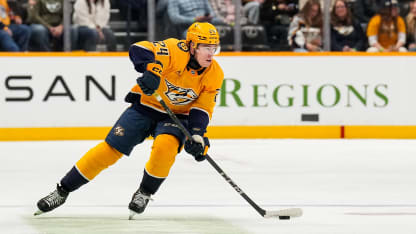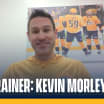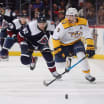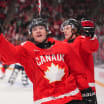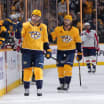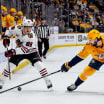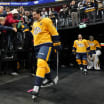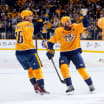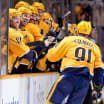Everyone involved in a professional sports organization wants to win, but at the American Hockey League level, there is an additional layer to the goal.
In Milwaukee, the Admirals - Nashville’s AHL affiliate - have developed over 200 players since the late 1990s who have gone on to not only play in the NHL, but many have had incredibly successful careers.
That balance between finding team success at the AHL level - and individual accomplishment to make it to the NHL - is something Admirals Head Coach Karl Taylor and his staff deal with on a daily basis, but they’ve found a way to make both elements work.
“Our focus since I've been here with [Preds Assistant General Manager, Director of Player Development and Admirals GM] Scott Nichol, management, myself, our assistant coaches, it's always been we want to win here, and not at the expense of development, not at the expense of helping players,” Taylor said. “You can do both.”
Exhibit A - not only did 10 different players receive at least one recall from Milwaukee to Nashville this season, but the Admirals also won the AHL’s Central Division title for the second consecutive campaign.
So, how does that happen when so many players are coming in and out of the lineup on a consistent basis?
“It's a little bit of a dance at times throughout the season,” Taylor said. “One might be more important than the other one. There’s time early in the season when you put young players into positions that make the coach uncomfortable, and you have to do those things for those growth moments. This time of the year [in the playoffs], those situations are mostly gone. Now it’s about winning… Our priority is Nashville, but within the room, we want to help everyone in that room find whatever goal they're trying to search for.”
Every player currently on the Milwaukee roster is focused on competing for the Calder Cup at the moment, but many will also have their sights set on one day playing in Nashville full time. Here’s what Taylor had to say on a few of those candidates and how their development has come along over the past few months.
On defenseman Spencer Stastney:
“He's enjoying himself more. I think he's more outgoing. I think he's realizing that he's got to live in the present - and he's still the best skater I've ever seen. He's still an elite prospect. He's probably pushing to be a full time NHLer next year, and he's a great individual. So, we've loved having him here… We had a gathering the other day, there's this team event, and his interactions within the group and how he's mixing, and it's just really strong. I'm really happy for him and where he's at in his career. He's a great name to bring up, because that's a person that is probably poised to take a step and just be a leader and demand more from himself and his teammates in an area. I think he's really poised to have a pretty strong playoff for us.”
On goaltender Matt Murray:
"He's had a great season. There have been times when I've tried to challenge him. He’s always been a good goalie, and I've pushed him. Our goalie department with [Director of Goaltending] Mitch [Korn], [Admirals Goaltending Development Coach] Jason [Barron] [and Goaltending Coach Ben Vanderklok] have done a great job with him. Matt’s a guy that I wanted to push to a new level. I’m never going to tell him, ‘Hey, do this or do this.’ That's for the goalie gurus to worry about, but from the mental side, I wanted him to really demand more of himself and become an elite goaltender, be a guy that can be counted on in all situations. To me, arguably, hopefully he was considered for MVP of the league. He led a lot of categories, and I just think his game has come to a new level. I know he's itching for the playoffs. He signed a new contract, well earned by him, very exciting for him and where he's at, and we feel very confident in starting off and having that behind us.”
On forward Cole O’Hara:
“He looks great, even in practice. He’s a good player. I have high hopes for him. Moving forward, I wouldn't be surprised if he gets games in the playoffs. Things always occur that can change your roster at times, and he's demanding our attention in practice. He played two good [regular season] games for us. He scored in his first game, which is always exciting and really happy for him. But in practice, his technique and his skills, his tactics, his work ethic, all the things we're looking for that sometimes are immature when a player first arrives here, they're pretty good. So, tip my hat to UMass and the coaches there. Obviously, we have a couple other guys from there that have done well; been a bit of a breeding ground for Admirals and also Nashville Predators. So, if he can follow those other two guys and have the success they have, he's going to be in good shape here.”
On forward David Edstrom:
“He seems like a very mature individual… We haven't seen him in a game, obviously, but based on practice, his positioning, his awareness, questions he asked, you learn a lot about the questions that are asked of you when you're coaching… He’s asked questions that are very intelligent on the inside of the game. He was in Frolunda; that's a great place to play. They play a similar style to us defensively… It can be a complicated transition, and for him, it's a good fit. It's very similar, and the nuances of it, he's asked very pertinent questions. So, I guess the wrap up is he's very intelligent. I'm excited to see him. Obviously, he's a highly talented prospect, but it's a new world. He's coming from Sweden. It's a new country, it's a new continent, it's all new. So we have to be patient with the young players to understand that it takes a different amount of time for every player. Everyone's got their own pace.”
On defenseman Ryan Ufko:
“Ryan had a slow start this year, which is probably expected. He came in for the playoffs last year, had a great playoff run for us, played all the games, produced, and did a lot of good things for us. And you have a summer, you come back, you do your NHL camp, it's kind of overwhelming. When you get to Milwaukee, you probably take a breath when you've had that success in the playoffs. And it's just part of his growth, and it's not a negative. Early on, it felt like a negative for him, but took him longer to get back to, ‘OK, this League's hard. I'm going to have to do these things,’ and that's all understanding the maturity of different players. He had to get through that. From game whatever, 25 on, he's been one of our best guys. He's producing. He's very confident on the ice. He defends well. We’ve pushed him in the areas. He's a skilled offensive defenseman, but he also defends pretty good and checks hard. So, we're trying to grow the areas. I'm not going to tell him how to hold onto a puck and be patient, do a spinorama when the guy's trying to kill him in the offensive blue line - he’s got that covered. I'm going to help him in the areas to create layers to his game, and so that when he does become a full time NHLer, he's able to do it with more effectiveness, and he gets to stay longer than expected. That's always the goal. Someone gets called up, there’s one game, let’s try to push it for two. ‘Let's try to extend your stay’ is the last message we always give our players.”

